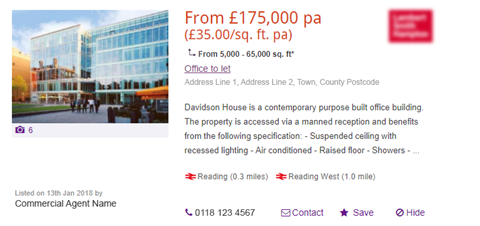There is a general acceptance in the industry that the commercial agency sector is behind the residential sector with regard to online marketing.

Agents often overlook portals as a channel to market their commercial property, considering their value to be restricted to the residential market. By doing so they are missing out on the anecdotal 80% of estimated leases which tend to be with unrepresented tenants who are likely to use the internet to start their search.
Define your lead management approach
For those agents that have made the move onto portals, they sometimes don’t capitalise fully on their online investment by not having a defined and consistent approach to lead management. From my many years working with the industry I’ve noticed some common practices which can hamper the number of successful lets.
Enrich the information on your listings
Often agents deliberately restrict the amount of information on their listing, with the intention that the potential tenant will be obliged to ring them for more details. I’ve found this has the reverse effect.

Enquirers use the internet to be informed – our data shows that listings with full information in the space available, images that support the description, plus quoting rents and full outgoings generate more enquiries to arrange a viewing. By restricting the information displayed agents often miss out on leads which instead go to competitors who provide more details.
Qualify and communicate with your leads
A telephone enquiry is always more valuable than an email lead, as it provides the opportunity to qualify and potentially convert that lead at the point of contact. We regularly review clients’ telephone leads with them, and frequently find that the person who answers the phone initially is uninformed regarding the property, and either puts the caller through to the agent’s voicemail or takes a message, potentially losing the opportunity.
As enquiries are from unrepresented tenants, a lack of knowledge regarding leasing premises can often be misinterpreted as an indication of a low-quality lead. We often hear an agent end a phone enquiry where the property may not be suitable for budgetary or other reasons without establishing the enquirer’s identity and requirement.
Determine decision makers
Establishing an applicant’s full details also enables you to determine whether the initial caller is the decision maker. One such example I witnessed recently was an industrial enquiry from a person ringing from their car. The unit in question was under offer to a blue-chip tenant and due to complete in a few weeks. By careful questioning the agent ascertained this was a potential business expansion of an existing privately-owned business, with a solid trading history and P&L. He was able to start discussions with the business owner on a potential pre-let of a similar unit on the estate where the current tenant was keen to surrender their lease.
On another occasion an agent was able to convert an enquiry that was not suitable for their building into an applicant and secured a fee for a 1,700 sq ft letting in the city of London.
Gearing for online success
Here are a few things you can start doing to ensure your agency is geared to success with your online marketing:
- Provide as much information on a property as possible, including internal and external images, full description and outgoings
- Avoid too much industry jargon – ie ’New FRI lease, VP 01.18’ isn’t a meaningful or compelling description to potential tenants
- Ensure there is an available point of contact in the office that has access to the particulars regarding all current instructions – they can act as a triage point for inbound enquiries, ideally to the point of booking viewings
- Respond to email enquiries promptly, and then follow up on the phone
- Have a process for logging enquiries – ideally a customer relationship management (CRM) system – so that follow-ups can be scheduled and progress monitored. This has the additional benefit of enabling you to monitor the return of your marketing investment.
Following these straightforward practices will help you to make the most of your online marketing. Contact ZPG to find out more.
Christopher McAlpine is the head of ZPG’s Commercial Property division. He has worked in the commercial sector for over 20 years. Prior to joining ZPG he co-founded Screenedata, a researched database of available office and industrial properties that was later acquired by Propex
































No comments yet